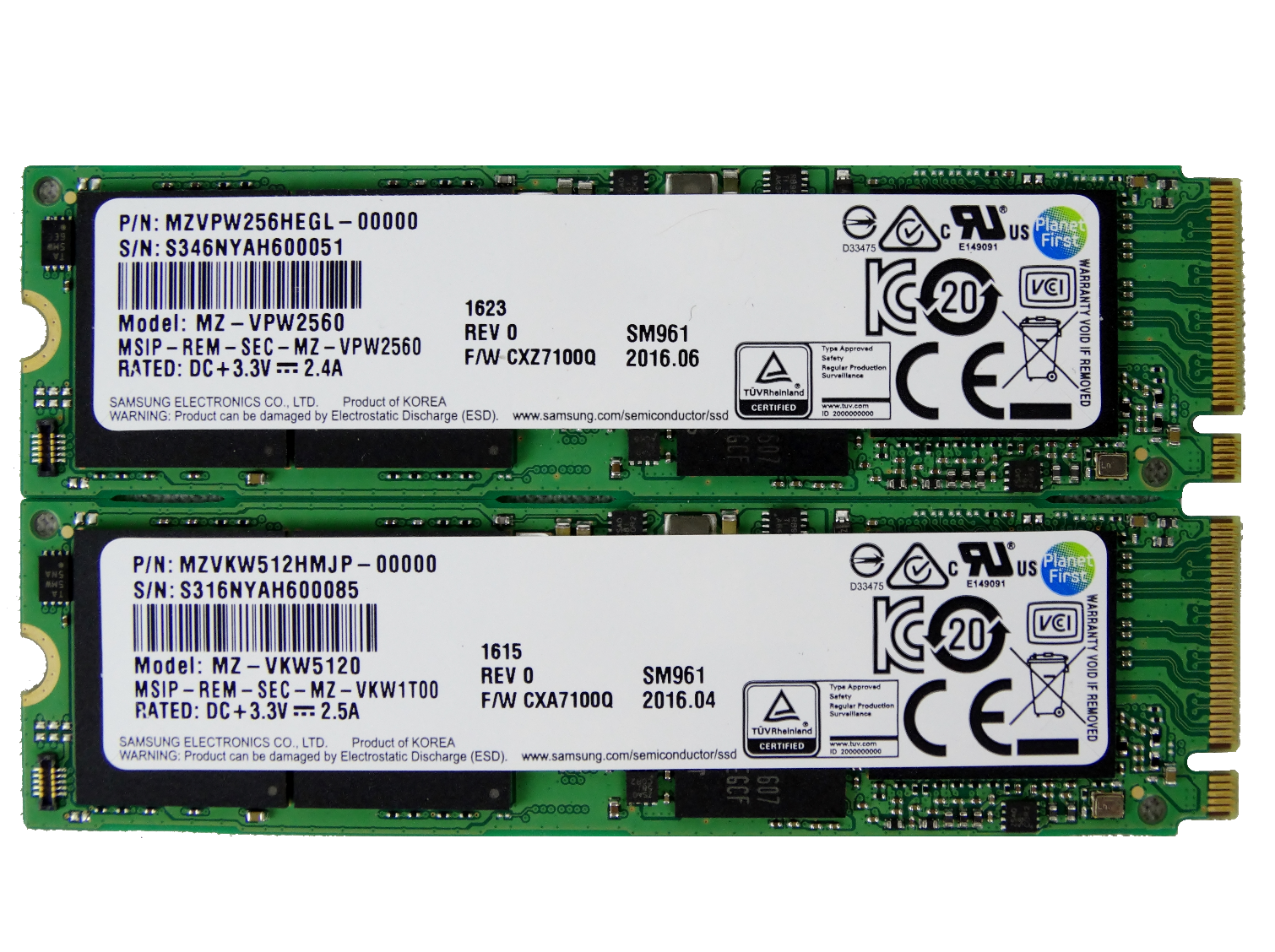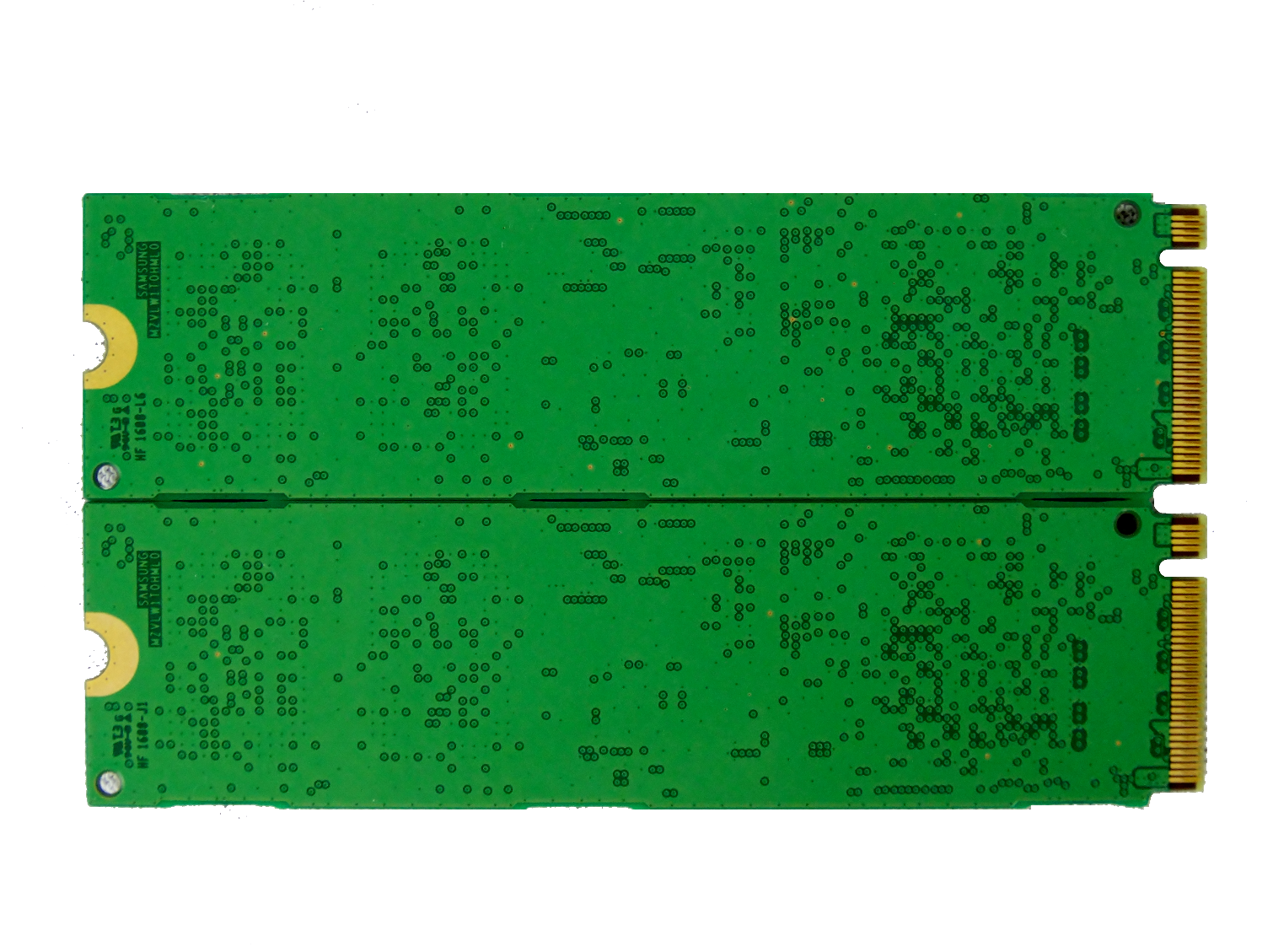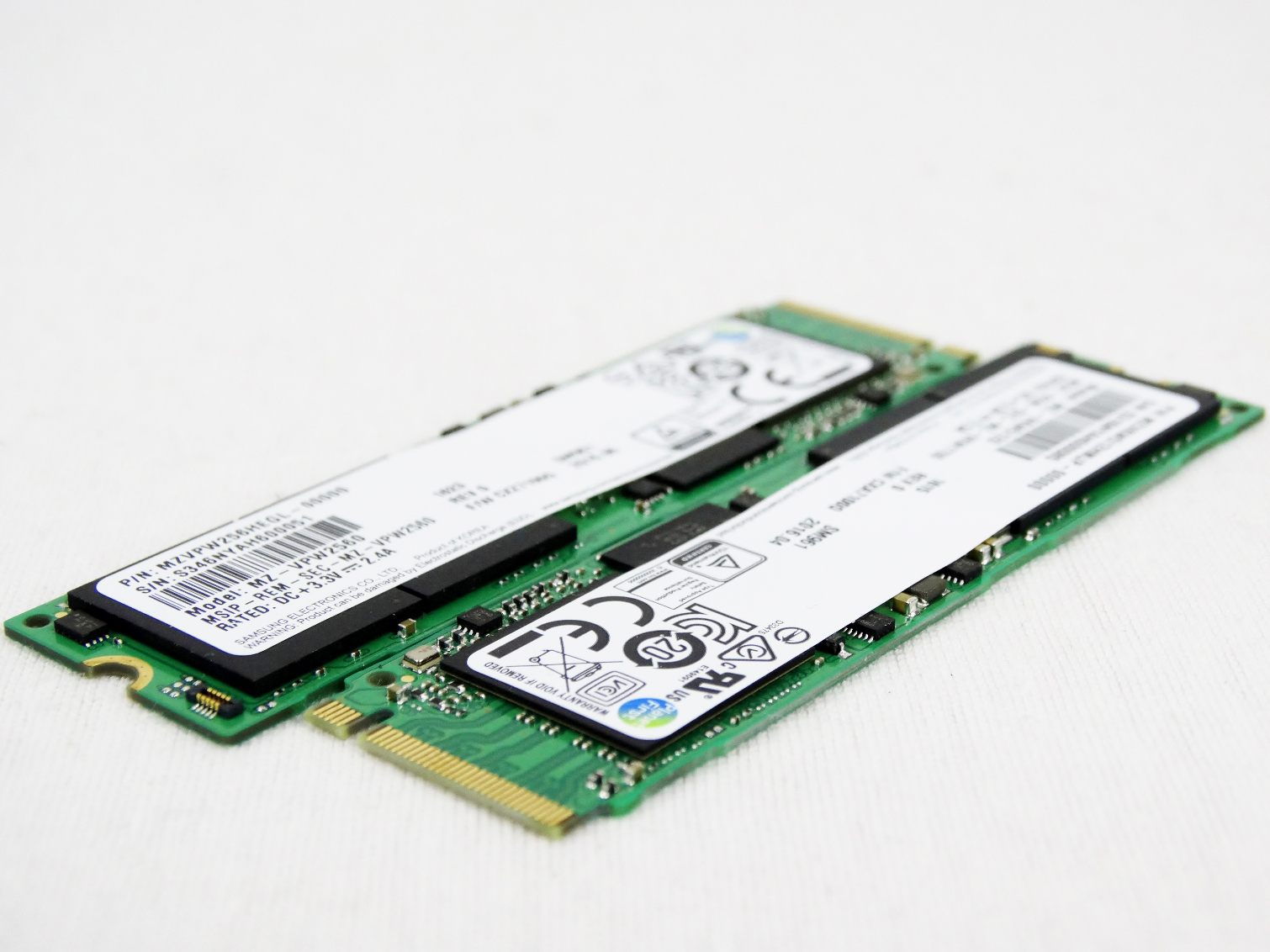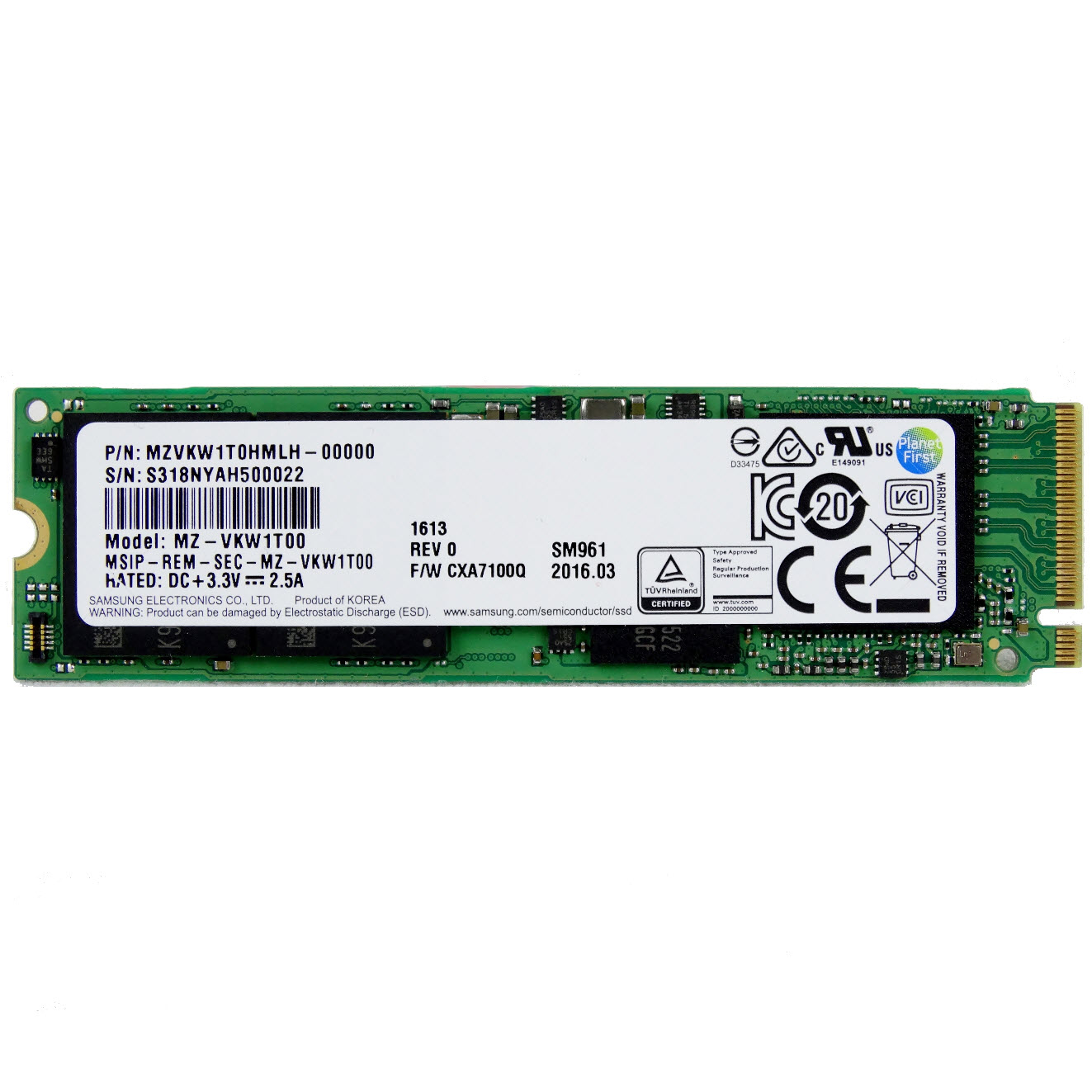Early Verdict
The Samsung SM961 series as a whole breaks new ground in both performance and pricing. We really like the 256GB and 512GB drives for the great value but would like to see some performance optimizations in the future, including support for the Magician software.
Pros
- +
Lowest Cost NVMe Solutions
- +
High Throughput Performance
- +
M.2 Form Factor
Cons
- -
Could Use A Firmware Tune
- -
Availability
Why you can trust Tom's Hardware
Specifications
The Samsung SM961 is not an official retail product from the company, and its OEM status makes availability first come, first serve. We've already delivered a dish of SM961 1TB to the table, and we follow that up with the main course and dessert, which comes in the form of the two most popular SSD capacities on the market.
Hefty 1 TB SSDs are great for enthusiasts and power users who don't mind spending more for computer parts. The SM961 1TB we recently tested retails for roughly $500, but the real value in the SM961 series lays in the 512GB drive, which balances capacity, performance and cost. The 512GB SM961 is a good option if you require a lower entry price and don't mind trading in some capacity or performance.
Today we compare the SM961 512GB and 256GB to other NVMe-based products on the market at the same capacity points. The SM961 1TB only squeaked by the others in performance, but it comes to market with a significant price advantage. The two capacity points we're testing today still cost less than other products currently shipping, but they do not dominate the field in all performance categories.
Technical Specifications
Samsung released the SM961 NVMe SSD to OEMs and the channel in four capacities that scale from 128GB to 1024GB (1TB). Of those, we only expect the largest three to be available, and we don't expect to see too many SM961 128GB drives selling from many resellers. Samsung didn't release the 950 Pro in a 128GB capacity, and that makes sense because these are all products for enthusiasts and power users.
Samsung's new Polaris controller is at the heart of all SM961 SSDs, and Samsung paired it with new 48-layer MLC V-NAND. Many of the 850 EVO SSDs have migrated over to 48-layer TLC V-NAND and the T3 Portable SSD also ships with it, so this is the first product that ships with the MLC version of Samsung's latest 3D flash. The 48-layer flash was the first 256Gbit die capacity to ship in any product, and it should lower the price of existing SSDs while also giving Samsung the ability to make new high capacity drives.
Today we're focusing on the 256GB and 512GB models that deliver over 3,100 MB/s sequential read performance. The 256GB drive achieves up to 1,400 MB/s of sequential write performance while the 512GB moves the needle up to 1,700 MB/s. The SM961's random read performance is 330,000 IOPS, while random writes are spec'd at 280,000 for the 256GB model and 300,000 for the 512GB model. The performance ratings from Samsung show a slight performance decrease from the large 1TB model, but we don't expect that to be a factor under real-world conditions due to the way SSD manufacturers calculate NVMe performance with multiple workers.
We reached out to Samsung Semiconductor for endurance ratings but still have nothing to report at this time. It appears Samsung will make us wait until the company's annual retreat for storage media, which should take place in the coming month. Samsung retail is quite busy with another product launch for later this week, but it is not the fabled 960 Pro/EVO that other sites have speculated about recently.
Get Tom's Hardware's best news and in-depth reviews, straight to your inbox.
Pricing, Warranty And Accessories
The Samsung SM961 does not come from the from the department responsible for the 950 Pro and other retail products. Instead, Samsung's SSI group develops and builds products for OEMs and large system integrators like Dell, HP and Lenovo. The large companies gain access to SSI's products early on, but over time the SSDs trickle down to distributors and then to resellers. This chain is commonly known as "the channel."
Australia-based RamCity has a history of bringing Samsung SSI products to the retail market. The SM961 256GB sells for $159 and the 512GB for $280, both of which are lower than the price of Samsung's flagship 950 Pro retail NVMe product. The SM961’s pricing is also tied to the Australian Dollar, so there is some day-to-day flexibility. The prices we quote in this article were given to us before the SM961 1TB review. Since then, the Australian Dollar has lost 10 percent to the US Dollar, thus making the SM961 SSDs cheaper for U.S. buyers.
The SM961 SSDs are currently on back order, which is common for a product with this level of demand. The supply will replenish with regularity until the company fills all of the preorders, and the company told us that it would build up stock for new sales.
RamCity sells the SM961 with a 3-year warranty, but since this is an OEM product it does not ship in a retail Samsung package or include any accessories. The company does wrap the drives in an anti-static bag that goes inside a foam-lined cardboard box. Shipping from Australia to my office in Indiana takes between three and five days, depending on what time I placed the order and where my order falls in relation to the weekend.
A Closer Look


All three of the SM961 SSDs we've tested use the same configurations with the new Samsung Polaris controller and two NAND flash packages. Samsung merely varies the number of die per package to adjust the capacity. The drives are all single-sided, so they fit in the slimmest of spaces. Some of the newer notebooks only support the single-sided design because the M.2 connector sits very close to the motherboard. The drives are 80mm long, also known as M.2 2280. The "2280" descriptor indicates the width (22mm) and the depth (80mm) of the SSD.
MORE: Best SSDs
MORE: How We Test HDDs And SSDs
MORE: All Storage Content

Chris Ramseyer was a senior contributing editor for Tom's Hardware. He tested and reviewed consumer storage.
-
oczdude8 Can you please make those line graphs more readable? Its really hard to distinguish between the 950 pro and the ocz drive. I suggest using dashes or dots as well as colours instead of using two very similar coloursReply -
velocityg4 I don't get why Samsung would make these an OEM exclusive. It seems to me that aftermarket enthusiasts would be the major purchasers.Reply
What OEM would even use these? Most OEM SSD options are low grade entry level SSD. Apple is the best I've seen, using the Samsung SM951 in a proprietary form factor. The highest I've seen any other OEM use is the Samsung PM951 (Dell XPS laptop, MS Surface, Lenovo Yoga 900).
Do these just show up in high end workstations or servers? So far the only manufacturer I'm aware of whom would likely include these would be Apple. If they ever get off their butts and update their premium priced yet obsolete hardware.
As manufacturers are hesitant to boast in their specs what SSD they use. How would you even know without purchasing the computer or finding a teardown that the SM961 is in there? -
CRamseyer HP, Dell, and Lenovo all sold products with the SM951. We purchased the Lenovo X1 Carbon Gen 3 just to the the first drive available for review. HP sent over a Z Turbo (SM951+workstation adapter) and the new quad version that puts 4 in a single PCIe device. Dell used the drive in one of the high end ultralight notebooks.Reply

